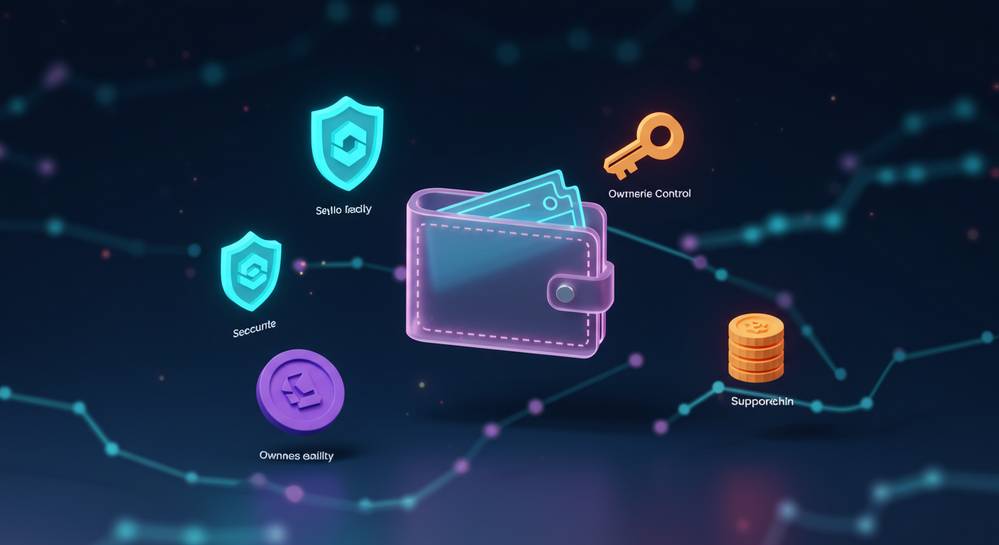Selecting a wallet is one of the most important decisions you will make in your crypto journey. It determines how you access, manage, and secure your digital assets. This guide provides a clear framework on how to choose a crypto wallet by breaking down the core types, essential features, and key security practices to help you find the perfect fit for your needs and ensure your funds are protected.
Understanding the main types of crypto wallets
The first step in learning how to choose a crypto wallet is to grasp the core categories available. Each type presents a distinct trade-off between daily convenience and long term security. Your choice depends on your crypto usage, primarily splitting into the fundamental difference between hot and cold storage.
Hot wallets for active users
Hot wallets are software connected to the internet. This makes them convenient for frequent transactions but also more vulnerable to online threats. They are ideal for holding small amounts of crypto for active trading or spending. These wallets come in several forms.
- Desktop Wallets: Software installed on your computer, offering a balance of features and security for PC users.
- Mobile Wallets: Smartphone apps perfect for on the go payments and interacting with decentralized applications.
- Web Wallets: Accessed through a browser, providing the quickest access but generally considered the least secure option.
Cold wallets for maximum security
Cold wallets store your private keys offline, disconnected from the internet. This method provides the highest level of security against digital theft. They are the preferred choice for holding significant amounts of crypto long term.
- Hardware Wallets: Physical devices that sign transactions offline, protecting your keys from ever being exposed to a connected computer.
- Paper Wallets: A physical printout of your keys. While secure if stored properly, they are fragile and difficult to use.
Key factors to consider when selecting a wallet

Once you understand the difference between hot and cold storage, you can narrow down your choice. Learning how to choose a crypto wallet means evaluating key factors against your personal priorities. The right wallet will align with your goals for security, supported assets, and technical comfort, leading to a confident decision.
Prioritize these core elements when making your selection:
- Security Features: This is the most critical factor. Your wallet must give you sole control over your private keys. Look for tools and technologies for protecting cryptocurrencies, like two factor authentication and a reliable seed phrase backup system. For hardware wallets, confirm the presence of a certified secure chip.
- Supported Cryptocurrencies: Not all wallets support all coins. Verify that your chosen wallet can hold every asset you intend to own. This simple check avoids the hassle of managing multiple wallets later on.
- Ease of Use: An intuitive interface is crucial, especially for beginners, as complexity can lead to costly mistakes. Look for a clean design and clear instructions. Consider testing a software wallet with a small amount to evaluate the experience.
- Cost and Fees: Software wallets are typically free, but network transaction fees are unavoidable. Hardware wallets are a one time purchase, representing an investment in the long term security of your assets.
Matching a wallet to your crypto journey

The best crypto wallet is not a one size fits all solution. Your choice depends on your specific goals within the crypto ecosystem. Matching a wallet’s strengths to your user profile is a key part of how to choose a crypto wallet, optimizing for both convenience and security.
For the long-term investor
If you plan to hold assets like Bitcoin for years, security is the top priority. A hardware wallet is the superior choice for this strategy. It keeps your private keys completely offline, shielding them from online threats. You only connect the device for rare transactions, ensuring maximum protection for your investments.
For the active trader or spender
Frequent traders and spenders need fast, reliable access to their funds. A hot wallet, such as one of the best mobile crypto wallets, is ideal. These wallets prioritize convenience, allowing for quick payments and seamless integration with trading platforms. They are designed for managing smaller, actively used amounts of crypto.
For the DeFi and NFT enthusiast
If you interact with dApps, yield farming, or NFT marketplaces, you need a versatile wallet. A web or mobile wallet with a browser extension is essential. This setup offers broad compatibility with most decentralized platforms, making it simple to connect and approve transactions securely on the blockchain.
Essential security practices and wallet features

Beyond choosing a type, understanding core security is the final step in how to choose a crypto wallet. A wallet is only as secure as the user operating it. Taking full responsibility for your keys and adopting strict security habits are non negotiable practices for every cryptocurrency owner. Your funds depend on it.
These practices are essential for your crypto wallet security:
- Private Key Control: The golden rule of crypto is that you must control your private keys to own your coins. Always select a non custodial wallet, which ensures you are the only one with access. Avoid storing significant funds on centralized exchanges where you do not control the keys.
- Seed Phrase Security: Your seed phrase, or recovery phrase, is the master key to your crypto. When you set up a wallet, write this phrase down and store it in a secure, offline location. Never create a digital copy or share it with anyone under any circumstances.
- Open Source vs. Closed Source: Open source wallets offer greater transparency. Their code is publicly available for security experts to review and audit for vulnerabilities. This process adds a crucial layer of community verified trust.
- Regular Updates: Reputable wallet providers consistently release software updates. These patches fix security holes and introduce new features. Always keep your wallet software updated to the latest version to protect against emerging threats.
Choosing the right crypto wallet is a foundational step in securing your digital assets. It involves balancing convenience with security and matching features to your specific needs, whether you are a long term investor, an active trader, or a DeFi user. By understanding the core differences and prioritizing your own security, you can make an informed choice. For more insights into the blockchain world, explore the resources at Dynamic Crypto Network.
